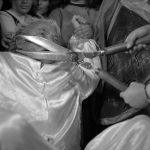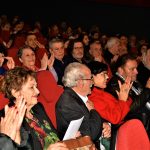| Kodi i referencës | I/2-189 |
| Titulli | Cajupi |
| Sinopsi | Fillon me gryka malesh dhe ne dubelekspozicion fotografi e Cajupit. Fshati Zagori, shtepia ku lindi Cajupi, busti i tij ne fshat. Babai i Cajupit Harito Caku, e ema Zoica. A. Pano reciton mbi varferine dhe kurbetin. Pamje e Aleksandrise dhe Gjenova ku Cajupi u diplomua per drejtesi. Vepra e shkruar nga ai per te shoqen. Pamje e qipariseve. egjipti dhe Heliopolis. Vendi ku vdiq Cajupi. Fotografi e Naimit dhe libri i tij “Lulet e veres” qe nxorri gjate luftes. Poezi e Cajupit ku ben kushtrim per liri. Fotografi e Filip Shirokes, Jani Vurkos dhe e Cajupit. Shkrimi “Duke kerkuar nje alfabet”. Liber me vjersha. Recitohet vjersha e bariut dhe te tjera te cilat shoqerohen me kuadro filmi. Cajupi nge krye kunder shfrytezimit te gruas. Gra te ngarkuara me dru. Libri i Cajupit me rrefenja. Aktoret e Korces duke luajtur ne skene komedine e Cajupit “Pas vdekjes”. Flet Sofokli Capi i cili ka jetuar me Cajupin ne Egjipt (sinkron). Fotografi e Avni Rustemit. Cajupi hartoi memorandumin qe shqiptaret i derguan konferences se paqes ne Paris. (280. 20m) Fotografi e Cajupit dhe doreshkrimet e tij. Cajupi shkruan kunder Zogut. Ne tragjedine “Burri i dheut” Cajupi riperterin figuren e Skenderbeut kurse ne Dhiaten e vjeter kritikon bejleret dhe kleriket. Cajupit i vdes i biri. Ne fotografi me Stefanin. Cajupi vdiq me 1930 ne Heliopolis. Eshtrat e atdhetarit sillen ne atdhe. Ne percjelljen e eshtrave moren pjese Dashnor Mamaqi, Kico Ngjela, Dhimiter shuteriqi, Behar Shtylla. Fatmir Gjata dhe Foto Stamo bejne roje nderi. Varri i Cajupit eshte prane Cerciz e Bajo Topullit. Sheper, fshati ku lindi Cajupi. Njerez qe punojne. Mbi themelet e shtepise se Cajupit ngrihet shkolla 7 – vjecare. Femije ne klase duke mesuar. Nje shkolle me emrin e Cajupit. Nje djale i vogel reciton (sinkron). Skulptori Llazar Nikolla punon bustin e Cajupit. Shtepia e kultures ne Gjirokaster mban emrin e poetit. Teatri Cajupi ne Korce. Ne skenen e Teatrit te Operes dhe Baletit Xhoni Athanas kendon i shoqeruar nga Ermira Gjoni. Aktori Qenan Toro reciton vargjet e poetit ne uzinen Dinamo. Mbaron me femijet qe vendosin lule ne bustin e Cajupit ne fshat. (228 m) |
| Çmime | |
| Skenarist | |
| Teksti | |
| Regjisor | Marianthi Xhako |
| Kompozitor | Donika Muci, formulim |
| Operator | Sokrat Musha Xhavit Behri, op/zeri |
| Piktor | |
| Montazhier | |
| Zëri | |
| Kategoria | Dokumentarë |
| Kroma | |
| Viti i prodhimit | 1966 |
| Viti i premierës | 1966 |
| Numri i akteve | 2 |
| Kohëzgjatja (në minuta) | 17 |
| Vendi i prodhimit | Shqiperi |
| Vendi i xhirimit | |
| Producenti | Kinostudio “Shqiperia e re” |
| Shënime | administrator i filmit: Ramadan Bekteshi. |
| © Copyright | Arkivi Qendror Shtetëror i Filmit |
Share This Article




